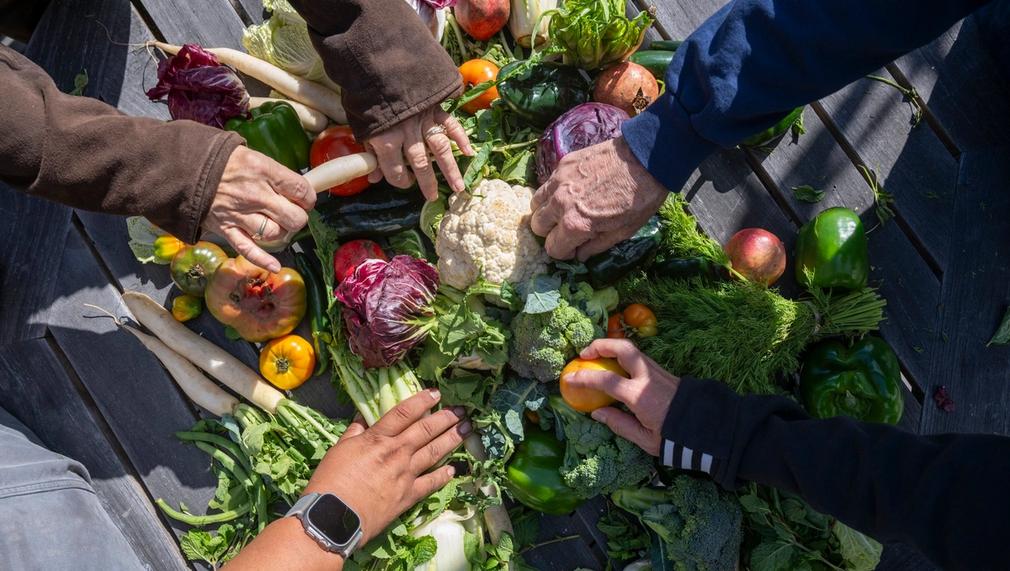Multi-benefit Spaces: From Parking to Produce
Holos will advance our work of addressing multiple crises by creating multi-benefit spaces, making our office parking lot more than its single intended purpose. Using excess space within the lot, we will add an edible garden and planters that generate food for the community, sequester CO2, and establish programming that brings together our neighbors, including those living at nearby Holos developments and local businesses, for events centered around addressing the consequences of income inequality, highlighting food access and climate change.

What is the primary issue area that your application will impact?
Income inequality
In which areas of Los Angeles will you be directly working?
San Fernando Valley
In what stage of innovation is this project, program, or initiative?
Pilot or new project, program, or initiative (testing or implementing a new idea)
What is your understanding of the issue that you are seeking to address?
Given LA’s car-centric culture, much of the city is surface parking, which contributes to the urban heat island effect, increasing heat and exacerbating the impacts of climate change, which are known to be disproportionately felt by underserved and lower income communities. It has also been shown that areas with lower median income levels have lower access to grocery stores and fresh food – the cost of which has continued to rise with the trend expected to carry on. As rents rise and wages do not follow sufficiently, individuals are also more likely to be unable to afford housing. All of these issues are interconnected; yet, the current methods that exist to address these issues are siloed. These siloes result in band-aid solutions that do not address the interconnected roots of these crises. Historically racist planning policies and funding restrictions for many programs have deprived communities of resources including access to fresh food and open space, and worsened climate impacts.
Describe the project, program, or initiative this grant will support to address the issue.
Addressing each of these issues through transforming parking lots to multi-benefit spaces through edible planters and gardens has the potential to have incredible impact throughout Los Angeles County and beyond. Holos’ first lot will be located in the parking lot of our office in North Hollywood. The lot is approximately 3,000 sq. ft. and will feature sustainable landscaping and an edible garden that will generate fresh produce for our community while simultaneously retaining its original use for parking. Holos is partnering with Ron Finley, a local Los Angeles urban gardener and creator of the Ron Finley Project, to design the plantings in the excess space. Holos will also work with local neighborhood groups, such as Growing Hope Gardens and food banks, to create programming that spans from educational workshops on planting, growing, and harvesting food to community-oriented events with food distribution included.
Addressing income inequality through creating a new, accessible fresh food source for our community while also mitigating harmful impacts of climate change is a step toward a holistic approach to address the interconnected crises we are currently facing. Coupling this physical access to food with educational and community-building programming will ideally amplify the efforts beyond those who are immediately able to access the food produced.
Describe how Los Angeles County will be different if your work is successful.
This project has the potential to transform LA County – our vision is to see the city’s many parking lots transformed into these multi-benefit spaces, and our goal is for the project to act as a pilot/proof of concept to inspire others to implement similar ones. We are committed to providing support for others to implement this type of work in their community through educational materials and potential partnerships. The program will demonstrate the positive impact of tackling multiple issues at once by using Maslow’s Hierarchy of Needs to ensure basic needs are met. Much of our work aims to address these needs in holistic ways rather than singularly working on one versus another as is much of the status quo in the US today. The project will result in those at low- to moderate-incomes directly gaining access to more fresh produce while also providing opportunities for community gathering and skill building, amplifying its impact.
Approximately how many people will be impacted by this project, program, or initiative?
Direct Impact: 100
Indirect Impact: 500